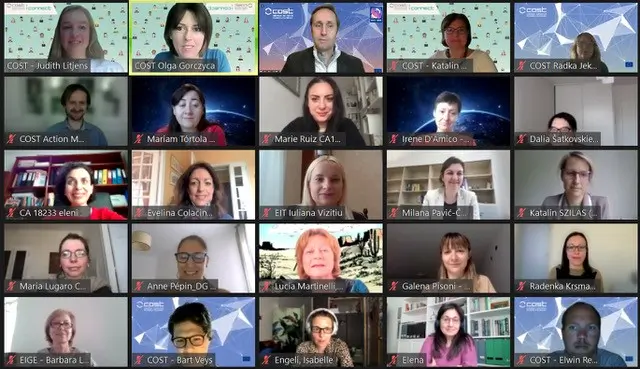On 29 April 2021, the first ever COST Connect on advancing gender equality in research and innovation was organised, bringing together a wide diversity of ambassadors of gender equality, including researchers and innovators from COST Actions and European Union policy stakeholders. The workshop contributed to the ongoing debate on this topic and offered a platform for discussion and networking between participants.
Gender equality in Research and Innovation

As a core value of the European Union, gender equality is a key principle to strive for in European research and innovation. In order to take scientific excellence to the next level and deliver science-based solutions to the many urgent and pressing global challenges, it is essential to fully tap into the European talent pool of researchers and innovators. This means adopting an inclusive approach whereby all efforts are made to close the gender gap and ensure that women have the opportunity to develop their talents fully.
Advancing gender equality in research and innovation is fully embedded as a key objective in European Union gender equality policy. While significant progress has been made over the last decades, the state of play in the EU demonstrates that we are still a long way from achieving full gender equality. Across Europe the numbers have increased over the last few years (women are indeed a majority amongst PhD graduates), however, only a third of women are scientists, a phenomenon especially visible in STEM (Science, Technology, Engineering and Mathematics) where women are even less represented.
Accelerating progress in gender equality
This first COST Connect on advancing gender equality in research and innovation was organised with the view to address the challenge, and to benefit from the experience and expertise of the participants active in the field.

Screenshot of the COST Connect online workshop – 29/04/2021
The event included sessions with testimonies from COST Actions and stakeholders, including the European Commission, the European Institute of Innovation and Technology (EIT), the European Institute for Gender Equality (EIGE), the European Platform of Women Scientists and the UNESCO Chair on Gender Equality Policies in Science, Technology and Innovation.
Participants were welcomed by Dr Ronald de Bruin, Director of the COST Association, who highlighted that “gender equality and gender mainstreaming in academic research is one of the priorities for the European Research Area, and therefore highly relevant to our COST Actions and of course the wider European research, innovation and policy landscape”.
As with all COST Connect events, the interactive format encouraged dialogue, active engagement and the creation of synergies among participants. Today’s event included presentations by several COST Actions and policy stakeholders, addressing how to advance gender equality in R&I from many interesting angles. Furthermore, participants were offered the opportunity to discuss, in break-out room sessions, a few key questions around two main challenges:
- How to get more women participating in research and innovation, including leadership positions?
- How to advance gender mainstreaming in research and innovation (funding) organisations, based on existing practices with a particular focus on the development of Gender Equality Plans (GEPs) and strategies.
More specifically, participants discussed the main structural barriers that prevent women from pursuing a career in research and innovation; the gaps in policy approaches that are currently in place; what can be done to make research careers more attractive to female researchers; and what can be done to better support female researchers in their career progression.
Some key points that were highlighted during the break-out room discussions included, among others, the persisting gap between women and men in science at the top of the professional ladder and how to address this; the importance of providing parents with access to childcare facilities; the need to put in place effective work-life balance policies for women and men; and removing (unconscious) gender bias and gender stereotypes.
Ms Iuliana Vizitiu from the European Institute of Innovation and Technology (EIT) reiterated the importance of removing (unconscious) bias, starting with schools: “We need to build a new culture, where everybody from a young age can choose what they like to do without social pressure. Removing gender stereotypes is very important. Mentorship programmes can help in this respect.”
Participants also stressed the need to give men a more prominent role in gender equality discussions to change the mind-set that gender equality is predominantly a ‘woman’s issue’.From the European Commission we learned that gender equality will be a cross-cutting priority in Horizon Europe. One of the ways in which the next Framework Programme will address this topic is by requesting participants that are public bodies, research organisations or higher education institutions established in a Member State or Associated Country, to have a Gender Equality Plan (GEP) in place.
Prof. Isabelle Engeli from COST Action ‘Professionalization and Social Impact of European Political Science’ (CA15207): “We need to avoid that Gender Equality Plans become a buzz word. Instead, they need to be well planned, monitored and have measurable goals supported by reliable data.”
Prof. Mario Agio, Chair of COST Action ‘Nanoscale Quantum Optics’ (MP1403): “Gender Equality Plans should not be an island, but should be supported and interconnected with other initiatives. We should sometimes speak up and go against the grain to keep making progress in the discussion.”
Advancing gender equality in COST Actions
For 50 years COST has been supporting the participation of women in science and continues to do so. Promoting gender balance throughout COST Actions’ activities is a key principle of the COST Excellence and Inclusiveness policy. Achieving gender balance is considered a key aspect of COST’s commitment to being open and accessible to all categories of researchers, and it is systematically highlighted as an obligatory consideration for COST Actions when planning their activities. COST Connect participants recognised COST as a front-runner regarding gender equality with its Excellence and Inclusiveness policy focus on gender.
Key statistics:
Women represent almost half of COST Actions’ members and 37% of COST Action Chair positions are occupied by women. 49% of Vice-Chair positions are held by women and 53% of Inclusive Target Countries (ITC) participants in COST Actions are women.
List of participants
COST Actions
- CA16117 – Chemical Elements as Tracers of the Evolution of the Cosmos
- CA18232 – Mathematical models for interacting dynamics on networks
- CA18108 – Quantum gravity phenomenology in the multi-messenger approach
- CA18112 – Mechanochemistry for Sustainable Industry
- CA19130 – Fintech and Artificial Intelligence in Finance: Towards a transparent industry
- CA17137 – A network for Gravitational Waves, Geophysics and Machine Learning
- CA19122 – European Network For Gender Balance in Informatics
- CA19112 – Women on the Move
- IS1409 – Gender and health impacts of policies extending working life in western countries
- IS1206 – Femicide across Europe
- MP1403 – Nanoscale Quantum Optics
- CA15207 – Professionalization and Social Impact of European Political Scienc
- CA18233 – European Network for Innovative Diagnosis and Treatment of Chronic Neutropenias
- TA1201 – Gender, Science, Technology and Environment (genderSTE)
Stakeholders
- BASNET Forumas – Regional Baltic States Association of women scientists working in STEM
- Belgian Women in Science (BeWise)
- European Commission – Joint Research Centre
- European Commission – DG Justice and Consumers, gender equality unit
- European Institute for Gender Equality (EIGE)
- European Institute of Innovation and Technology (EIT)
- European Platform of Women Scientists
- Donne e Scienza – Italian Association of Women Scientists
- Regional Network of Women in STEM in the Western Balkans
- UNESCO Chair on Gender Equality Policies in Science, Technology and Innovation
Further reading
- Agenda of the COST Connect on ‘advancing gender equality in research and innovation’
- COST video on supporting women in science and technology
- COST Excellence and Inclusiveness Policy
- European Commission Gender Equality Strategy 2020-2025
- European Commission SHE Figures publication 2018
- European Institute for Gender Equality (EIGE) – Gender Equality in Academia and Research (GEAR) tool
